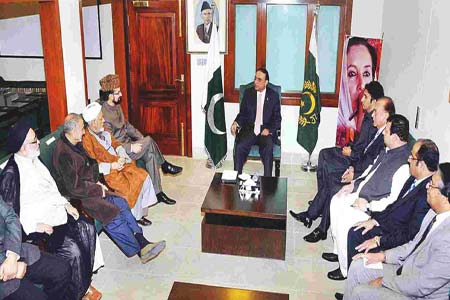In September 1947, when late Sheikh Mohammad Abdullah was released from jail, a month after India and Pakistan got freedom from the British and one month before Maharaja Hari Singh fled from Kashmir, Sheikh had not made up his mind on whether J&K state should accede to India or Pakistan. Sheikh asked Ghulam Mohammad Sadiq, his then close aide, to go to Pakistan and find out how much internal autonomy Ali Mohammad Jinnah was willing to give in case J&K decided to accede to Pakistan which made Sadiq the first Kashmiri politician who visited Islamabad to discuss Kashmir isue. Sheikh himself also planned on visiting New Delhi to gauge how much autonomy India was ready to provide J&K.
“Sheikh sent Sadiq to Pakistan only to know that what was in the kitty of Islamabad for Kashmir. It was a time when Sheikh had not made his mind about the political future of J&K,” said Mohammad Yousuf Taing. Later, when Nehru reconciled with Sheikh, he requested Sheikh to act as a bridge between India and Pakistan and bring President Ayoub Khan to New Delhi for talks for a final solution of the Kashmir problem. President Khan sent telegrams to Nehru and Sheikh with the message that as Pakistan too was a party to the Kashmir dispute, any resolution of the conflict without its participation would not be acceptable to Pakistan. This paved the way for Sheikh Abdullah’s visit to Pakistan in 1964.

“At this point of time, Sheikh tried to bring the two neighboring countries closer so that a resolution is carved,” said Taing. Before leaving for Islamabad, Sheikh met Nehru and he educated him in his own way how to talk to the Pakistan government. Journalist and historian, Shabnum Qayum, is of the opinion that Nehru brainwashed Sheikh ‘so that those germs in his minds are washed which could prove parasite for India’.
The government of Pakistan in 1947 viewed Sheikh and his party as agents of Nehru and did not recognize his leadership of Kashmir. However, there was a change in Pakistan’s viewpoint with the passage of time. When Sheikh visited Pakistan in 1964, he was given a warm welcome by the people of Pakistan. Among the persons who received him were Chaudhary Ghulam Abbas, his once colleague and later a bitter political enemy, who had, earlier in his book ‘Kashmakash’, denounced Sheikh Abdullah as a turncoat and a traitor.
The then Pakistan President, Ayub Khan and his then Foreign Minister, Zulfikar Ali Bhutto, discussed the Kashmir problem with Sheikh. The government of Pakistan treated him as a state guest. Sheikh had the rare distinction of having poems written in his praise by three major Pakistani Urdu poets namely Hafeez Jallundhri, Josh and Faiz Ahmed Faiz who admired his lifelong struggle against injustice and for rights of the common kashmiri.
“When Sheikh and Mirza Afzal Beg were in Pakistan in 1964, they had one point agenda of discussing Kashmir issue with the Pakistani leadership,” said Taing. Sheikh however, was skeptical about his own future as well in case of accession of Kashmir to the state of Pakistan. He has given a vivid account of the talks he had with two representatives of Pakistan, Dr. Mohammad Din Tashir and Sheikh Sadiq Hassan, president of the Punjab Muslim League, who visited Srinagar. They tried to persuade him to make his mind for accession of Kashmir to Pakistan. Instead of giving a clear reply, Sheikh prevaricated. He rather wanted a clear assurance for himself before taking any positive decision in favor of accession to Pakistan. Both of them invited Sheikh Abdullah to visit Lahore and have direct talks with Jinnah. Sheikh accepted the invitation.
He held extensive talks with Pakistani government to explore various avenues for solving the Kashmir problem. Pakistan had agreed to come to Delhi in mid-June for talks with Nehru as suggested by Sheikh. Even the date of his proposed visit was fixed and communicated to New Delhi. On 27 May 1964, while Sheikh was en route to Muzaffarabad in Pakistani-administered Kashmir, the news of Nehru’s death reached Sheikh after addressing a public rally at Muzaffarabad and he hurriedly returned to Delhi. On his suggestion, President Ayub Khan sent a high-level Pakistani delegation led by his Foreign Minister, Zulfikar Ali Bhutto, along with him to take part in the last rites of Jawaharlal Nehru.
“Nehru’s death, I think, was an unfortunate moment for Kashmir. Had he survived for some time, he would have surely sorted out the issue with Pakistan which had consented to Sheikh to send a delegation to New Delhi,” says M Y Taing. He however made it clear that till 1964, India had done whatever it could to normalize ties with Islamabad and it —















